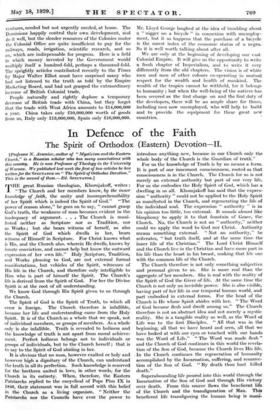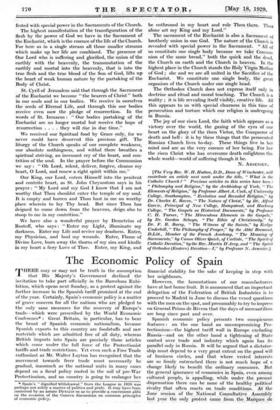In Defence of the Faith
The Spirit of Orthodox (Eastern) Devotion—II.
[Professor N. Arseniev, author of "Mysticism and the Eastern Church," is a Russian scholar who has many associations with this counby. He is now Professor of Theology in the University of Warsaw. We published last week the first of two articles he has written for the SPECTATOR on" The Spirit of Orthodox Devotion." This is the second of them.—Ed. SPECTATOR.] THE great Russian theologian, Khomjakoff, writes : "The Church and her members know, by the inner knowledge of faith, the unity and incomprehensibility of her Spirit which is indeed the Spirit of God." "The power of reason alone," he goes on to say, "cannot grasp God's truth, the weakness of man becomes evident in the inadequacy of argument. . . The Church is mani- fested neither as Scripture nor as Tradition, nor as Works ; but she bears witness of herself, as also the Spirit of God which dwells in her, bears witness of Himself in Scripture. For Christ knows what is His, and the Church also, wherein He dwells, knows by innate conviction, and cannot help but know the outward expression of her own life." Holy ;Scripture, Tradition, and Works pleasing to God, are not external formal manifestations, but vehicles of the Spirit, witnesses of His life in the Church, and therefore only intelligible to Him who is part of himself the Spirit. The Church's life is derived from the Spirit of God. For her the Divine Spirit is at the root of all understanding.
We know God through His Spirit given to us through the Church.
The Spirit of God is the Spirit of Truth, to which all error is foreign. The Church therefore is infallible, because her life and understanding came from the Holy Spirit. It is of the Church as a whole that we speak, not of individual members, or groups of members. As a whole Only is she infallible. Truth is revealed to holiness and the knowledge of truth is not apart from moral achieve- ment. Perfect holiness belongs not to individuals or groups of individuals, but to the Church herself ; that is to say to the Spirit of God abiding in her.
It is 'obvious that no man, however exalted or holy and however high a dignitary of the Church, can understand the truth in all its perfection. Such knowledge is reserved for the brethren united in love, in other words, for the Church in its entirety. When, therefore, the Eastern , Patriarchs replied to the encyclical of Pope Pius IX in 1848, their statement was in full accord with this belief in the Church as a living organism. "Neither the Patriarchs nor the Councils have ever Ihe power to introduce anything new, because in our Church only the whole body of the Church is the Guardian of truth."
For us the knowledge of Truth is by no means a form. It is part of our innermost consciousness, rooted as that consciousness is in the Church. The Church for us is not merely an external authority but part of our very life. For us she embodies the Holy Spirit of God, which has a dwelling in us all. Khomjakoff has said that the expres- sion " authority " could not be applied to the Holy Spirit as manifested in the Church, and regenerating the life of the individual soul. The expression " authority " is in his opinion too little, too external. It sounds almost like blasphemy to apply it to that fountain of Grace, the Church. No, the Church is not an "authority," neither could we apply the word to God nor Christ. Authority means something external. "Not an authority," he reiterates, "but truth itself, and at the same time the inner life of the Christian." The Lord Christ Himself and the Church live in the Christian and have more part in his life than the heart in his breast, making that life one with the common life of the Church.
The Church therefore is not only something subjective and personal given to us. She is more real than the aggregate of her members. She is real with the reality of the Spirit of God the Giver of life. At the same time the Church is not only an invisible power. She is also visible, having part of her life in our temporal human world, and part embodied in external forms. For the head of the Church is He whose Spirit abides with her. "The Word of God became flesh and dwelt among us." The Church therefore is not an abstract idea and not merely a mystic reality. She is a tangible reality as well, as the Word of Life was to the first Disciples. "All that was in the beginning, all that we have heard and seen, all that we have looked at with our eyes or touched with our hands was the Word of Life." "The Word was made flesh" and the Church of God continues in this world the revela- tion of the Son of God, because the Church lives His life. - In the Church continues the regeneration of humanity accomplished by the Incarnation, suffering, and resurrec- tion of the Son of God. "By death thou hast killed death."
Superabounding life poured into this world through the Incarnation of the Son of God and through His victory over death. From this source flows the beneficent life of the Church and the transfiguration of Man. This beneficent life transfiguring the human being is mani- fested with special power in the Sacraments of the Church. The highest Manifestation of the transfiguration of the flesh by the power of God we have in the Sacrament of the Eucharist, which is the essence of the life of the Church. -For heie as in a single stream all those smaller streams which make up her life are combined. The presence of Our Lord who is suffering and glorified, the Miion of the 'earthly with the heavenly, the transmutation of the earthly and mortal into the heavenly, that is into the true flesh and the true blood of the Son of God, lifts up the heart of weak human nature by the partaking of the Body of Christ.
St. Cyril of Jerusalem said that through the Sacrament of the Eucharist we become "the bearers of Christ" both in our souls and in our bodies. We receive in ourselves the -seeds of Eternal Life, and through this our bodies . receive even now the pledge of resurrection. In the . . .
words of St. Irenaeus : "Our bodies partaking of the Eucharist are no longer mortal but receive the hope of resurrection . . . . they will rise in due time."
We received our Spiritual food by Grace Only, for we never could have deserved this precious gift. The liturgy of the Church speaks of our complete weakness, our absolute nothingness, and withal there breathes -a spiritual striving, an incessant cry of the heart, and con- trition of the soul. In the prayer before the Communion we say : "Oh Lord, relent, deliver, forgive, cleanse my heart, 0 Lord, and renew a right spirit within me."
Our King, our Lord, enters Himself into the penitent and contrite heart, as St. John Chrysostom says in his prayer : "My Lord and my God I know that I am not worthy that Thou shouldst enter the temple of my soul. It is empty and barren and Thou hast in me no worthy place wherein to lay Thy head. But since Thou has deigned to come down from the heavens, deign also to stoop to me in my contrition."
We have also a wonderful prayer by Demetrius of Rostoff, who says : "Enter my Light, illuminate my darkness. Enter my Life and revive my deadness. Enter, my Physician, and heal my wounds. Enter, Flame of Divine Love, burn away the thorns of my sins and kindle in my heart a fiery Love of Thee. Enter, my King, and be enthroned in my heart and rule Thou there. Thou alone' art my -King and' my. Lord."
The Sacrament of the Eneliarist is also a Sacrament of brotherly Union in one God. The nature of the Chinch is revealed with special power in the Sacrament. " All of 'us constitute one single body because we take Commu- nion of the simie bread," both the prick and the dead, the Church on earth and the Church in heaven. Iii the highest place in the Church Stands the Holy Virgin Mother of Gcid ; she and we are all United in the -Sacrifice of the Eucharist. We Constitute one single'body, the' great organism of the Church Under One single head.
• The Orthodox Church does not express itself °lily in doctrine and ritual and moral teaching. The Church is n reality, it is life revealing itself Visibly, creative life. All this appears to us with Special clearness in this tithe of persecution and torture Which our religion is undergoing in Russia: - • The joy of our risen Lord, the faith which appears as a victory over the world, the gazing of the eyes of our heart on the glory 'of the risen Victor, the Conqueror of death and hell : it is by these things that the persecuted Russian Church lives tO-clay. These things live i her - - - - • • mind and are. as the very essence of her being. For her the risen Christ who has overcome death enlightens the whole world—world of suffering though it be.
N. ARSENIEV.
, [The Very Rev. W. H. Hutton, D.D., Dean of Winchester, will contribute an article next week under the title, "What is the Catholic Church " Previous articles in this series have been : "Philosophy and Religion," by' the' Archbishop of York, "The Elements of Religion," by Professor Albert A. Cock, of University College, Southampton, "Evolution and Revealed Religion," by Dr. Charles E. Raven, "The Nature of Christ," by Di. Alfred Oarvie, Principal of New College, Hampstead, and Hackney College, "The Gospels as Historical Documents," by Professor C. H. Turner, "The Miraculous Elements in the Gospels," by Dr. Gordon Selwyn, "The Ethic of Christianity," by Dr. F. R. Barry, "The Witness of the Saints," by Evelyn Underhill, "The Philosophy of Prayer," by the AbN Bremond, D.Litt., Member of the French Academy, " 7:he Meaning of Sacraments," by Canon Oliver Quick, of Carlisle, "The Spirit of Catholic Devotion," by the Rev. Martin D' Arcy, and " The Spirit of Orthodox (Eastern) Devotion—I," by Professor N. 'Armin)]













































 Previous page
Previous page